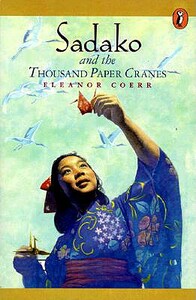You need to sign in or sign up before continuing.
Take a photo of a barcode or cover
My class read this book in fourth grade, and I still remember it well. My teacher stood in front of us all and held up three books, reading us the synopsis of each, and then asking us to choose which we wanted to read. One was this book. I was fascinated by the synopsis and voted to read this one, as did everyone in the class, like the little masochists we were. When we finished it, the teacher was left to console a class of crying 10 year olds. The book touched my heart, and I was deeply inspired by Sadako's will to survive. A full 5 stars!
inspiring
reflective
sad
fast-paced
Plot or Character Driven:
Character
Strong character development:
Yes
Loveable characters:
Yes
Diverse cast of characters:
No
Flaws of characters a main focus:
No
emotional
hopeful
inspiring
fast-paced
Plot or Character Driven:
Character
Strong character development:
No
Loveable characters:
Yes
Diverse cast of characters:
Yes
Flaws of characters a main focus:
No
emotional
informative
reflective
sad
medium-paced
Plot or Character Driven:
Character
Strong character development:
Yes
Loveable characters:
Yes
Diverse cast of characters:
Complicated
Flaws of characters a main focus:
Complicated
This is a compelling story of a real girl who lived in Japan from 1943 to 1955. Sadako Sasaki was born in Hiroshima, and was just a baby at the end of WW 2. Her grandmother was killed when the United States dropped the atomic bomb on her city. As the book opens, it is nine years after that terrible day, and the citizens of Hiroshima are about to celebrate Peace Day. Sadako’s parents remind her and her siblings that the celebration is not just an occasion for a carnival, but a solemn opportunity to honor those who died. But in her youth, Sadako sees only good omens; she’s confident she will have success on her school’s track team, fun with friends, and a loving family.
Within a few months, however, she will be diagnosed with leukemia, an aftereffect of the radiation from the atom bomb. Her best friend gives her some paper and scissors and teaches her to make a paper crane. She reminds her that the legend states if a sick person can fold 1,000 paper cranes the gods will make her well. With a renewed sense of hope, Sadako begins to fold cranes.
This is a very straightforward story, appropriate for children 9-12 years old. It is sad, but inspiring. The realities of Sadako’s condition are depicted without being overly graphic or grim.
Within a few months, however, she will be diagnosed with leukemia, an aftereffect of the radiation from the atom bomb. Her best friend gives her some paper and scissors and teaches her to make a paper crane. She reminds her that the legend states if a sick person can fold 1,000 paper cranes the gods will make her well. With a renewed sense of hope, Sadako begins to fold cranes.
This is a very straightforward story, appropriate for children 9-12 years old. It is sad, but inspiring. The realities of Sadako’s condition are depicted without being overly graphic or grim.
emotional
sad
fast-paced
Plot or Character Driven:
Character
Strong character development:
Yes
Loveable characters:
Yes
challenging
dark
emotional
hopeful
informative
inspiring
reflective
sad
fast-paced
Plot or Character Driven:
Character
Strong character development:
N/A
Loveable characters:
Yes
Diverse cast of characters:
Yes
Flaws of characters a main focus:
Complicated
emotional
inspiring
sad
fast-paced
Plot or Character Driven:
A mix
Strong character development:
Yes
Loveable characters:
Yes
Diverse cast of characters:
No
Flaws of characters a main focus:
No




